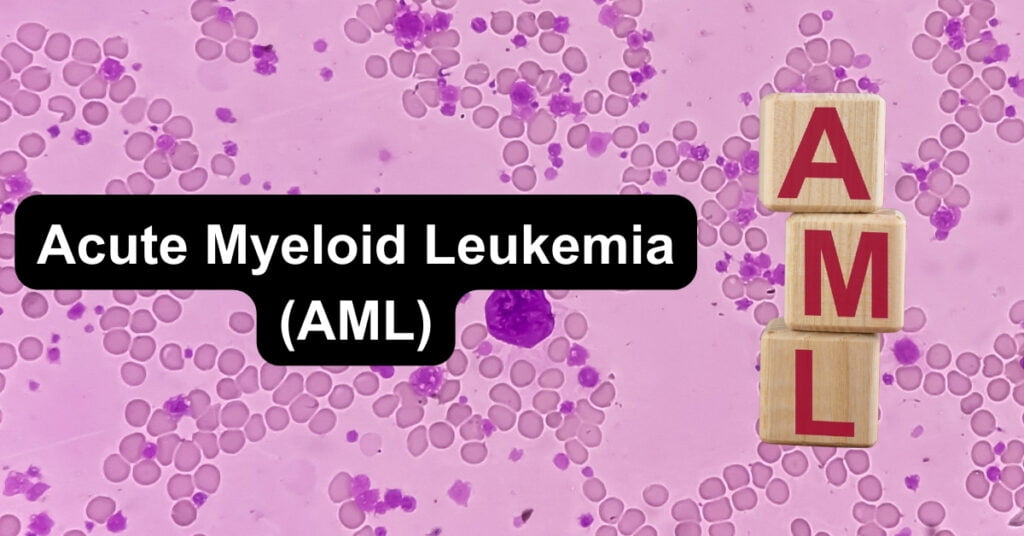Acute Myeloid Leukemia (AML)

AML, a type of cancer, occurs when cells in a specific body area start proliferating uncontrollably. This condition encompasses various cancer types, with cells in almost any body part susceptible to becoming cancerous. Leukemias, a type of cancer, originate from cells that would typically mature into different blood cell types. While most leukemias originate from early forms of white blood cells, some begin in other blood cell types. Leukemias are categorized primarily by their pace of growth (acute or chronic) and whether they originate from myeloid or lymphoid cells.
Acute myeloid leukemia (AML) originates in the bone marrow, where new blood cells are formed, and often quickly spreads into the bloodstream. It may also spread to other body parts like the lymph nodes, liver, spleen, central nervous system, and testicles. It is known by various names like acute myelocytic leukemia, acute myelogenous leukemia, acute granulocytic leukemia, and acute non-lymphocytic leukemia.
Acute Myeloid Leukemia (AML) Symptoms
Early-stage AML symptoms often resemble those of the flu or other common illnesses. They may include:
- Fever
- bone pain
- Fatigue
- Shortness of breath
- pale skin
- frequent infections
- easy bruising
- unusual bleeding (nosebleeds or bleeding gums)
Recent posts
Comprehensive Stomach Cancer Care at PI Health Hospital Your Trusted Center for Stomach Cancer Treatment with Advanced Technology and Compassionate Care At …
Vitamin D and Your Health: The Sunshine Vitamin Explained | Pi Health Hospital Introduction: What Is Vitamin D? Introduction: What Is Vitamin …
Acute Myeloid Leukemia (AML) Causes
While the exact cause of DNA mutations leading to AML is unclear, certain risk factors increase susceptibility:
- Advancing age, with AML more common in adults over 65.
- Gender, as men are more prone to AML than women.
- Previous cancer treatments, particularly chemotherapy and radiation therapy.
- Exposure to high levels of radiation or hazardous chemicals like benzene.
- Smoking, which is linked to AML due to the presence of cancer-causing chemicals in cigarette smoke.
- Pre-existing blood disorders like myelodysplasia.
- Genetic disorders such as Down syndrome.
Many individuals with AML exhibit no identifiable risk factors, while some with risk factors may never develop the disease.
Acute Myeloid Leukemia (AML) Diagnosis
To diagnose AML, several tests and procedures are conducted, including:
- Complete blood count (CBC) to check blood cell levels.
- Peripheral blood smear to examine blood cell characteristics.
- Flow cytometry is used to analyze the properties of cells.
- Bone marrow aspiration and biopsy to examine bone marrow, blood, and bone samples.
- Tumor biopsy to collect tissue samples from suspected tumors.
- Cytogenetic analysis is used to detect chromosomal abnormalities.
- Molecular testing is used to assess genetic mutations or changes.
- Immunophenotyping is used to identify cancer cells based on surface markers.
- Reverse transcription-polymerase chain reaction test (RT-PCR) to measure genetic material levels.
Acute Myeloid Leukemia (AML) Treatment Options
Treatment for AML involves multiple modalities and typically occurs in two phases, which include induction therapy to achieve remission and post-remission therapy to prevent relapse. Supportive care is crucial to managing treatment side effects. Treatment options include:
- Chemotherapy, either systemic or intrathecal.
- Radiation therapy, particularly for CNS involvement or as part of total-body irradiation.
- Chemotherapy uses stem cell transplants to replace damaged blood-forming cells.
- Targeted therapy aimed at specific cancer cells.
- Other drug therapies, like arsenic trioxide and all-trans retinoic acid.
Stages of AML
AML typically progresses through stages:
- Early-stage AML: Characterized by mild symptoms or asymptomatic.
- Intermediate-stage AML: Symptoms may worsen, and cancer spread may occur.
- Advanced-stage AML: Severe symptoms and widespread cancer spread, potentially affecting various body organs and systems.
Acute Myeloid Leukemia (AML) Prognosis
Prognostic factors influencing AML outcomes include:
- Age at diagnosis
- Overall health status
- Cytogenetic abnormalities
- Molecular mutations
- Response to induction therapy
- Minimal residual disease levels
- Post-remission therapy outcomes
AML prognosis is generally less favorable in older adults, those with adverse cytogenetics, and individuals with treatment-resistant disease.
AML Complications
AML complications arise from cancer growth, treatment side effects, or other factors. Common complications include:
- Anemia: Reduced red blood cell count leading to fatigue and weakness.
- Thrombocytopenia: Low platelet count causing bleeding and bruising.
- Neutropenia: Decreased white blood cell count increasing infection risk.
- Febrile neutropenia: Fever associated with a low white blood cell count.
- Infections: Opportunistic infections due to compromised immune function.
- Bleeding: Excessive bleeding due to a low platelet count.
- Organ dysfunction: Liver, kidney, or heart dysfunction due to cancer spread or treatment toxicity.
- Secondary cancers: Development of other cancers due to previous treatment.
- Emotional and psychological effects: Anxiety, depression, or distress due to cancer diagnosis and treatment.
- Financial burden: High treatment costs and reduced productivity are impacting finances.
Acute Myeloid Leukemia (AML) Prevention
Prevention strategies for AML primarily focus on minimizing exposure to known risk factors like radiation, hazardous chemicals, and smoking. Early detection and treatment of pre-existing blood disorders may reduce the risk of AML. Routine medical check-ups and cancer screenings facilitate early diagnosis and timely intervention.
In summary, it’s crucial to highlight the vital role of heightened awareness, early detection, and access to comprehensive care in effectively managing Acute Myeloid Leukemia (AML) and ultimately improving patient outcomes. By educating both healthcare professionals and the public about the signs, symptoms, and risk factors of AML, individuals can better recognize warning signs and seek prompt medical attention.

Dr. A. Venugopal
Clinical Director & HOD, Senior Consultant Medical Oncologist and Hemato Oncologist
About Author
Dr. A. Venugopal
MD (General Medicine), DM (Medical Oncology), MRCP – SCE Medical Oncology (UK), ECMO (Switzerland).
Dr A. Venugopal is One of the best medical oncologist and Hemato Oncologist in hyderabad, currently serving as the Head of the Department and Senior Medical Oncologist, Hemato Oncologist at Pi Health Cancer Hospital in Gachibowli, Hyderabad. He brings over 15 years of extensive experience in the field of Oncology.


